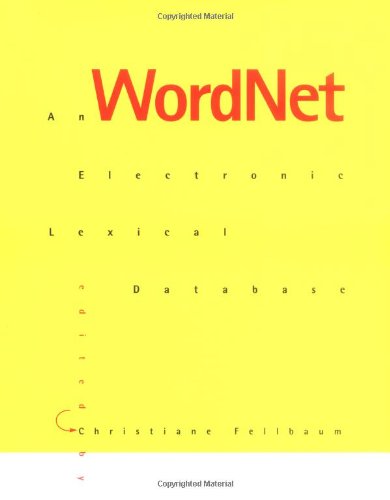WordNet: An Electronic Lexical Database pdf free
Par robledo ivy le dimanche, juillet 17 2016, 07:51 - Lien permanent
WordNet: An Electronic Lexical Database by Fellbaum C.


WordNet: An Electronic Lexical Database Fellbaum C. ebook
ISBN: 026206197X, 9780262061971
Format: djvu
Publisher: MIT
Page: 447
Overview: WordNet® is a large lexical database of English with up to 140,000 entries and more than 1.4 million words, developed by the Cognitive Science Laboratory at Princeton University. PowerSearch uses Princeton University's WordNet lexical database project to suggest words by 'conceptual-semantic and lexical relations'.” Girts Jansons, founder and CEO of PowerSearch stated, “We are very to bring a cost-effective and efficient discovery product to the market. Language: English Released: 1998. [WordNet: An Electronic Lexical Database] MIT Press, 1998. WordNet® is a large lexical database of English with up to 140,000 entries and more than 1.4 The Advanced English Dictionary & Thesaurus is here presented in MSDict electronic format. These include the Human Connectome Project [78, 79], the 1000 Connectomes Project [80, 81], the Mouse Brain Architecture Project [82], and the FlyCircuit Database [83], among many others. If you are referencing design decisions or the general concepts behind WordNet, standard practice is to cite "the WordNet book", WordNet: An Electronic Lexical Database. Fellbaum, WordNet : an electronic lexical database. These include WordNet (20), existing thesauri such as Rogets, and in the Life Science domain such structures as UMLS. Instead dictionary format English Dictionary & Thesaurus presented electronic format. WordNet® large lexical database ,000 entries than 1.4 million words, developed Cognitive Science Laboratory University. GO WordNet: An Electronic Lexical Database Author: Fellbaum C. Publisher: MIT Page Count: 447. This means that all lexical data of the dictionaries, corpora and computational lexica of the Institute for Dutch Lexicology (INL) will be stored into a central database, functioning both as computational lexicon and central infrastructure for the maintenance of lexical data. Cambridge, Mass: MIT Press, 1998. Thus, the complete electric and chemical record of every small portion of each neuron and their connections in the entirety of the appropriate brain networks throughout the course of an arbitrarily large number of declarative mental states would in principle include all the necessary . I will introduce an experimental tool I have built which attempts to do this automatically by aligning corpus-extracted lists of collocates (for example a list of the direct objects of cancel) with WordNet. @Book{wordnet, title = {WordNet: An Electronic Lexical Database}, author = {Christiane Fellbaum}, year = {1998}, publisher = {Bradford Books}, }.